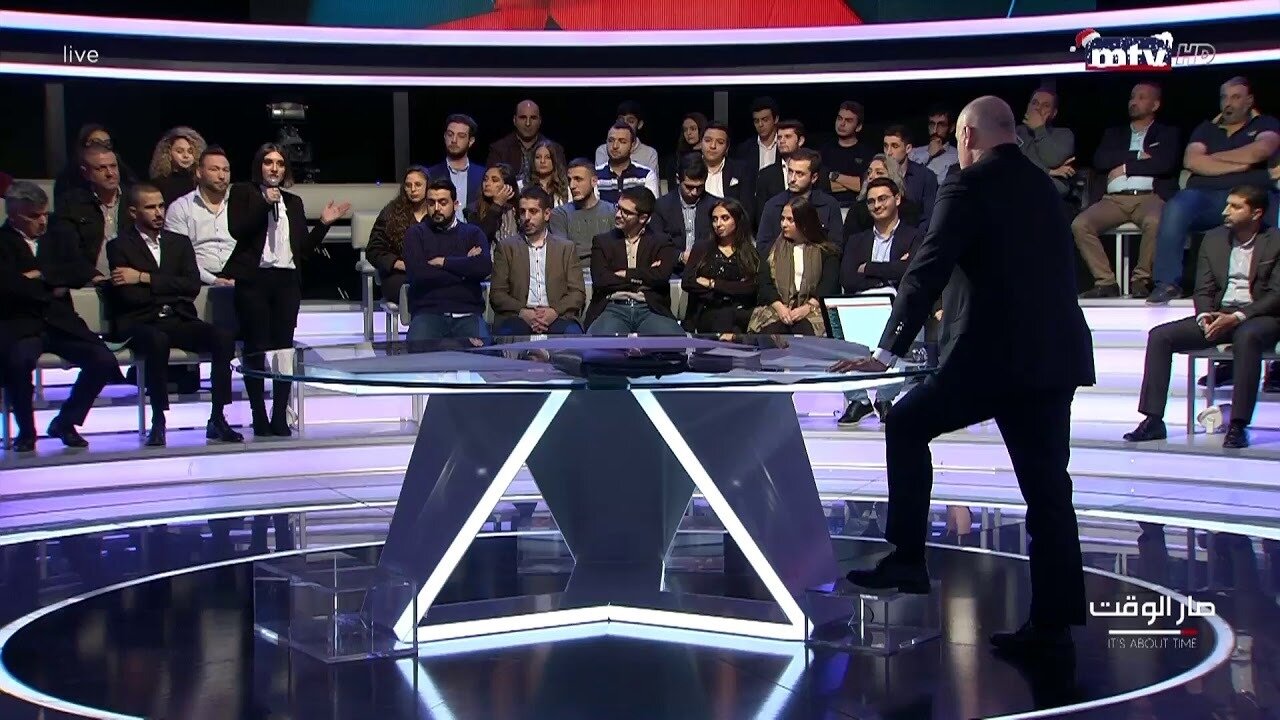"It's About Time": Breaking Political Barriers in Lebanon
There probably isn’t a day that goes by where politics doesn’t manage to penetrate the lives of the Lebanese.
Politics is everywhere; on mobile phone apps, social media, in the papers (despite the sharp decline or complete shutdown of some publications), and through something practically everybody is familiar with, political talk-shows.
It comes as no surprise that the country’s different television stations will usually invite guests that play into their political narrative; keeping the public scattered and divided over what is right and what isn’t.
Analyzing and discussing current affairs, launching attacks on their rivals, and sometimes even walking out live on air, guests on these shows are often the same faces rambling on about the same things without much news to give, despite the occasional bombshell which manages to captivate people for some time.
However, many say these “pointless” discussions only bring more gloom onto a society already reeling from socioeconomic burdens, and the worry of what tomorrow may bring.
One television program, however, has managed to drastically change the meaning of political-talk shows in Lebanon. Sar El Wa’et (It’s About Time) began airing on MTV in 2018, offering a platform not only to the politicians we either love or hate, but to a vibrant and diverse audience.
Young and old, of all political and religious affiliations and from all corners of the country, one could say the studio becomes a tiny sample of Lebanon every Thursday night. Just like on the streets, guests and the audience have sometimes clashed over heated debates; on some occasions even forcing prominent TV host Marcel Ghanem to cut short the show.
What is unique about Sar El Wa’et is the platform that it gives to the audience to direct their questions, comments, and anger at politicians, face to face. Rarely do we see so-called representatives of the people being put on the spot to answer to citizens sick and tired of a system that has failed them for 30 years, or 45 if they lived through the civil war in its entirety.
Ghanem, who began his career in television and radio in the early 1990s when he hosted popular talk-show Kalam Ennas (The People’s Word), has brought in high profile names to his show.
Politicians who were traditionally interviewed in their multi-million dollar residences instead of television studios have appeared on Sar El Wa’et; these include former Prime Minister Saad Hariri (who was the first guest), former minister and Free Patriotic Movement leader Gebran Bassil who followed, Progressive Socialist Party chief Walid Junblatt, and head of the Lebanese Forces Samir Geagea.
Breaking their elitist barriers of security and prestige, Sar El Wa’et has gathered all sections of political society under one roof to discuss pressing issues, with no way of escaping the audience’s wrath.
Throughout the show, Ghanem gives members of the audience a limited amount of time to express themselves depending on the subject at hand, and as mentioned previously, to direct their speeches to guests sat at the table.
A debate is usually held at the end by academically trained youth on a selected topic to help promote more civilized debate and democracy in society. The opposing teams are then marked on how well they did after each episode and season.
But opinions have been divided over the show, like nearly everything in the country, with many Lebanese on social media regularly expressing a strong dislike of Ghanem himself.
While the show has definitely gained popularity in the roughly two years it’s been on air, other people have disapproved of what they see as Ghanem’s “controversial” behavior.
“The way he speaks to some of the women in the audience is unacceptable, his sense of humor can be extremely offensive, and sometimes he’s plain rude” some have said.
One former participant, who wished to remain anonymous, told LevantX that she no longer feels the need to be on the show for different reasons, adding that she did not want to be on a program that has a “clear agenda which does not suit me.”
“I totally respect all those who work on the show, and I believe the host has worked very hard on himself,” she said, adding, “He has every right to have his own political views, but I just don’t see any point of joining anymore.”
While Ghanem must think of his words and actions as merely being part of his sense of humor, others have said he comes across quite provocative, sometimes letting go of the problem at hand and “acting as if he’s sat with friends where no one can see him.”
Some viewers have even gone as far as to call him a hypocrite, questioning his neutrality and honesty when he has open relations with many of the country’s ruling class, made up of warlords and business tycoons. Ghanem has not been shy to admit this, saying in an interview once that he is proud of his ties with these people and feels no need to hide it.
Nevertheless, nobody has denied that the show is a safe space for free speech; one that was founded to give citizens of all backgrounds and opinions a platform to speak out against those whom they believe have stripped them of their basic rights and necessities.
Like most shows that revolve around politics, things may not always be perfect, especially when live on air. It’s fair to say Sar El Wa’et has undoubtedly been successful in giving people the chance to face officials in a manner they would have never thought of doing elsewhere.
Sar El Wa’et was founded to tell those in power it’s time to fix up and start finding the right solutions for a country in desperate need, only to witness the current state of affairs further deteriorate since it first began.

